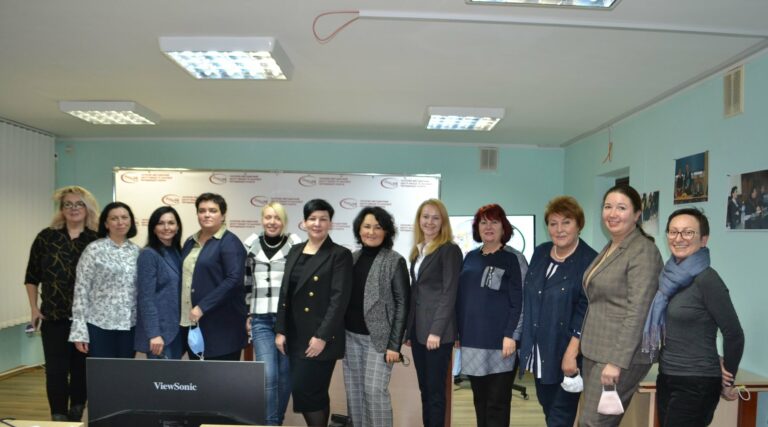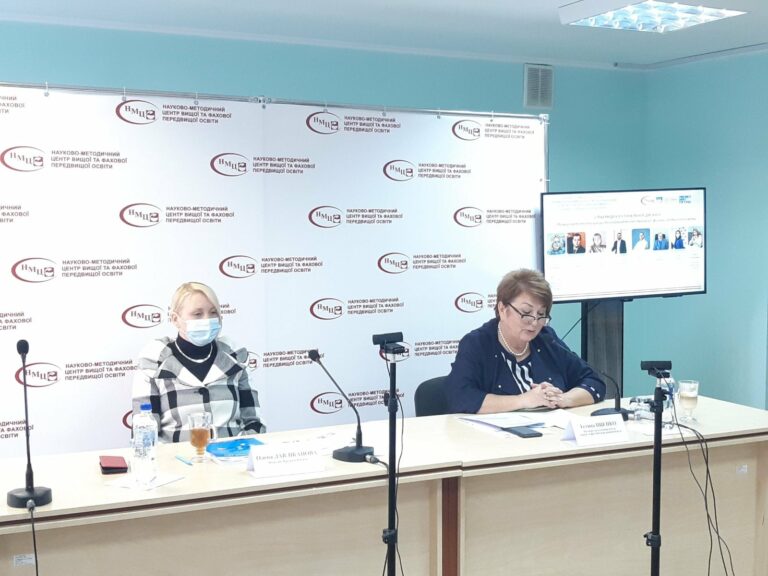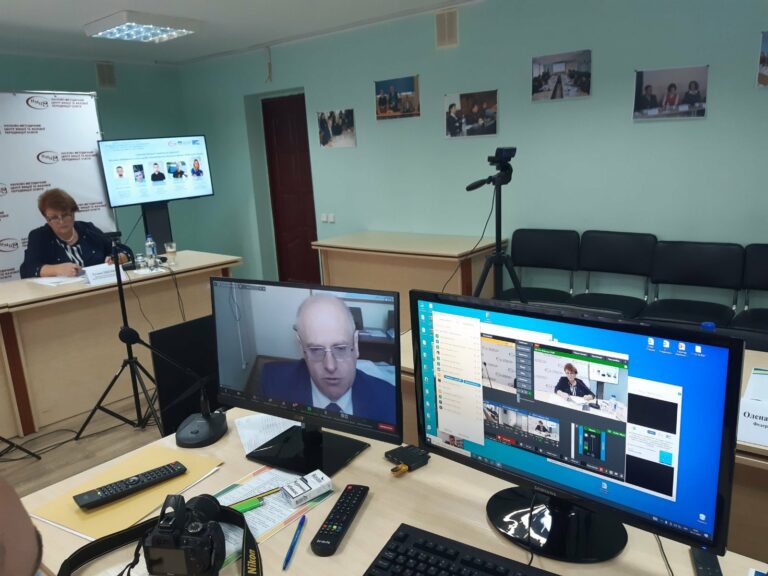It is neither “extra-mural studies”, “distance learning”, nor industrial practice, but a separate original form that combines university or college studies and training at the workplace – dual education has recently become increasingly popular in Ukraine, despite (often fair) criticism.
This is evidenced by the intermediate results of the pilot project on the implementation of this form of training in institutions of vocational high and higher education.
Following the second year of the project, an analytical report was recently prepared and published, as well as a conference organized by the Scientific and Methodological Center for Higher and Vocational High Education in partnership with the Friedrich Ebert Foundation and the Ministry of Education and Science (MES) of Ukraine.

MES’s EMPHASIS
Today dual education is “legalized” in the Ukraine’s legislation, namely, in the laws of Ukraine “On Education”, “On Higher Education”, “On Vocational High Education”. Thereby, appropriate conditions are created for the implementation of this form of education in the activities of universities and vocational schools. In autumn 2019, at the Order of the MES a large-scale pilot project on dual education was launched.
However, let’s note that even without participating in the project, institutions can implement dual education within their autonomy (and some of them have already gained considerable experience). According to the Ministry, the task of the experiment is to develop various models of dual education in Ukraine over four years, and dual education system as well, which will be useful for both education and business, will provide better prospects and opportunities for students.
At the conference, Oleg Sharov, Director General of the Directorate of Higher and Vocational High Education of the Ministry of Education and Science, reminded that 44 institutions of vocational high and higher education took part in the experiment at its start, and this number surged to 79 colleges and universities as of the end of 2021. About 300 employers were involved in the experiment, including representatives of large, medium and small businesses.

According to the Ministry of Education and Science, the national context requires the customization of foreign experience to the realities of the Ukrainian economy and precludes creation of a unified approach to the organization of dual-based education in all specialties. “The Ministry does not consider it expedient to transform all higher and vocational high education into dual education, as the dual education system is an extensive, integrated form of education for those who are ready to combine education in an educational institution and gaining experience in real production”, the report says.
The Ministry of Education and Science emphasizes that the organization of dual training in the system of higher and vocational high education is a more complex, time-consuming process compared with vocational education, as it requires more careful balancing of interests.
WORK ON REGULATION
As a result of last year’s conference, the Ministry of Education and Science, together with representatives of educational institutions and employers, prepared a draft Regulation on the dual form of higher and vocational high education, which is currently undergoing a complex approval procedure.
– We had problematic discussions, firstly, with representatives of employers and trade unions, – Oleg Sharov said. – Step by step, it is possible to find compromises. In particular, there is some pressure from the IT business, which does not want to conclude employment contracts in the framework of the dual education.
However, without contracts, any form of “labor slavery” can occur. Therefore, the Ministry of Education and Science insists on their mandatory availability.
Currently, the employment contract, which was conceived as a tool to protect the rights of the undergraduate in the company, unfortunately, creates other problems. Olena Davlikanova, project coordinator of the Friedrich Ebert Foundation Representation in Ukraine talked about it. “Not all employers understand that the dual form of education does not imply that the undergraduate efficiently works 40 hours a week,” the expert said. “When will he/she study with such a workload?”
Oleg Sharov emphasized that it is the educational institution that is responsible for the undergraduate training, completion of the educational program, for the quality of the educational process, not the employer.
After all, any employer has other functions and tasks, so it is the task of the educational institution to integrate employers into the educational process.
ASPECTS OF COOPERATION
The speakers have repeatedly pointed out that the results of the experiment were affected by the quarantine restrictions imposed because of the COVID-19 pandemic, which led to significant changes in the usual mode of the educational process and the work of enterprises. This has particularly affected service business.
As a result, some partner companies approved by the Order of the Ministry of Education and Science of Ukraine to participate in a pilot project on the dual form of education, did not have the opportunity to continue the experiment.
However, according to the report, the dual form of education has not lost its relevance, and employers try to resume cooperation with educational institutions and students at soon as conveniently may be.
Another problem that sometimes arises is that as soon as the employer solves his staffing problems and augments the staff with graduates, the employer immediately begins to lose interest in cooperating with educational institutions. In this context, there are sometimes proposals to introduce certain benefits for companies involved in the training of undergraduates, such as tax incentive.
Unfortunately, as Olena Davlikanova said, for the second year in a row there are cases when the undergraduate studies, for example, “mining engineering”, but works as a salesman.
– This is not a dual education, but a combination of study and work that are not related to each other – Ms. Davlikanova says. – In the dual form, the specialty of the undergraduate and his/her work at the company should be related.
There are also cases when undergraduates perform auxiliary “go-and-bring” functions, which is not related to what they should study. That is, the employer solves the problem of lack of cheap labor using undergraduates.
Certainly, the conference did not limit itself to stating the problems; the ways to solve them were suggested too. Representatives of educational institutions were unanimous in their opinion that the dual form of education requires appropriate organizational support.
– Relevant issues should be regulated with the help of a system of agreements, – says Larysa Shaulska, a professor at the Taras Shevchenko National University of Kyiv. – They must be concluded correctly and anticipate possible deviations, and provide measures to respond to them. There is also a need for constant feedback between all participants in the process: the partner company, the educational institution and the student. But in any case, the role of the institution is leading, and the models of interaction may be different.
– When we design an educational program, we start with the analysis of the staffing needs of the company, – said the Head of the Educational and Methodological Department of the M.E. Zhukovsky National Aerospace University “Kharkiv Aviation Institute”, Maxim Romanov. – If there are any, then we design the program which correlates with the needs of the enterprise, its work tasks. That’s why we are calm when we send the undergraduate student to the enterprise. There is a relevant coordinator, mentors, we have stable feedback, so we are confident that the undergraduates do exactly the work that will allow them to deepen the competencies which are indicated in the academic program.
At the Dmytro Motorny Tavriya State Agrotechnological University, such issues as the position of the undergraduate, its compatibility with the content of the curriculum in a particular semester, list of academic subjects related to this position, are studied at the stage of competitive selection of undergraduates. This was stated by the Vice-Rector of the University for Scientific and Pedagogical Work Oleksandr Lomeyko. “If the position does not meet these requirements, we simply do not apply the dual form to the undergraduate,” – adds Mr. Lomeyko.
Polissya National University is also meticulous in the selection of partner employers. A coordination center exists at the University, which is responsible for the dual form of education.
– We go directly to the enterprise, look at the logistics, examine whether the enterprise is really developing, whether it has the opportunity to practically train our undergraduates, – said the Head of the Training and Research Center for Dual Education of Polissya National University, Vita Bugaychuk. – We also communicate with future mentors.
There have been many cases when the enterprise itself approached us or our undergraduate students found enterprises where they would like to study according to the dual education system. Employers expressed a desire to hire 20 undergraduates at once. However, when we explain them what the dual form is, how it should be organized, the enterprise agrees on a maximum of four undergraduates.

RESULTS OF THE RESEARCH
The report on the results of the second year of the pilot project includes the results of the study conducted among its participants – institutions of vocational high and higher education, their designated employers-partners, as well as undergraduates who studied under the dual education system.
The monitoring showed that during the first year of the pilot project the vast majority of enterprises (77%) operated on the basis of bilateral agreements concluded between the enterprise and the institution, and in the 2020/2021 academic year almost all of them (94%) worked under tripartite agreements between the enterprises, university or college, and student. 92% of undergraduates confirmed the availability of such agreements.
In the 2020/2021 academic year, the number of higher education institutions which declared that the procedure for selecting students for training under the dual education system was developed jointly with the employer, tripled (64% compared to 20% in 2019/2020).
Two-thirds of the surveyed colleges also cooperate with partner employers on this issue.
39% of employers said that now they influence training programs and are interested in the further possibility of influencing them.
These are usually large enterprises where groups of undergraduate students study.
Olena Buchynska, an associate professor of the Marketing Department at the Vadym Hetman Kyiv National University of Economics, said that two-thirds of those who studied in accordance with the dual form of education would recommend it to other students, which proves the attractiveness of this form of education.
Prepared by Dmytro SHULIKIN
Svit newspaper, № 1-2, January 2022
